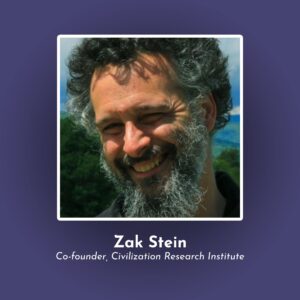
Show Summary
On this episode, Nate is joined by philosopher and educator Zak Stein to discuss the current state of education and development for children during a time of converging crises and societal transformation. As the pace of life continues to accelerate – including world-shaking technological developments – our schools struggle to keep pace with changes in cultural expectations. What qualities are we encouraging in a system centered on competition and with no emphasis on creating agency or community participation? How is unfettered technology and artificial intelligence influencing youth – and what should parents, adults, and teachers be doing in response? What could the future of education look like if guided by true teacherly authority with the aim to create well-rounded, stable young humans with a sense of belonging and purpose in their communities?
About Zak Stein
Dr. Zak Stein is a philosopher of education, as well as a Co-founder of the Center for World Philosophy and Religion. He is also the Co-founder of Civilization Research Institute, the Consilience Project, and Lectica, Inc. He is the author of dozens of published papers and two books, including Education in a Time Between Worlds.
In French, we have a motto that says that a simple drawing is often better than a long explanation. Jean-Marc Jancovici Carbone 4 President
That’s very understandable because with left atmosphere thinking, one of the problems is that you see everything as a series of problems that must have solutions. Iain McGilchrist Neuroscientist and Philosopher
We can’t have hundreds and hundreds of real relationships that are healthy because that requires time and effort and full attention and awareness of being in real relationship and conversation with the other human. Nate Hagens Director of ISEOF
This is the crux of the whole problem. Individual parts of nature are more valuable than the biocomplexity of nature. Thomas Crowther Founder Restor
Show Notes & Links to Learn More
Download transcript00:00 – Zak Stein works + Info, Civilization Research Institute, Education in a Time Between Worlds, Center for World Philosophy and Religion, First Principles and First Values
03:24 – No Child Left Behind
03:56 – Joseph Tainter + TGS episode
03:53 – Iatrogenic
05:30 – Daniel Schmachtenberger (TGS Episodes), Ken Wilbur, Marc Gafney
16:01 – Effects of screens and social media on teen mental health
16:54 – Marshall McLuhan
17:20 – The importance of adult boundary and limit setting for children
18:17 – How social media affects the brain
19:06 – The rise of ADHD in the 90s and effects on education – a timeline
19:58 – Hypercompetitive primary education systems
20:20 – High level of stress and cheating in primary education
22:28 – Scandinavian school systems
26:27 – Cold war effects on the education system
26:35 – Sputnik
27:25 – Tech elites don’t give their kids tech
28:35 – Elite overproduction, Peter Turchin
34:10 – Your Unique Self
37:28 – Iain McGilchrist + TGS Episode
38:02 – Moral Relativism
43:27 – Foundations of advertising
47:07 – Negatives of standardized testing
47:22 – Donald T. Cambell – Campbell’s law
48:57 – Nature vs Nurture Debate
49:20 – Cooperation and competition
52:10 – Effects of a competitive school environment
55:02 – The effects of an above-and-beyond teacher
55:42 – Legitimate teacherly authority
59:55 – Importance of the environment in the first 5 years of life
1:02:20 – John Dewey
1:10:31 – The best way to learn is to teach
1:11:40 – David Graeber, Bullshit Jobs
1:15:25 – How standardized testing increased high education access
1:16:08 – Civilian Conservation Corp, Lawrence A. Cremin
1:17:02 – New Deal
1:22:07 – Risks around artificial intelligence
1:24:58 – Rise of relationships with AI
1:28:41 – First Chatbot ELIZA
1:30:01 – Electricity use of AI
1:37:30 – The Future of Human Nature
1:41:19 – Peak Oil
1:42:29 – Mental Health Crisis
1:46:35 – Correlation of COVID with IQ loss







